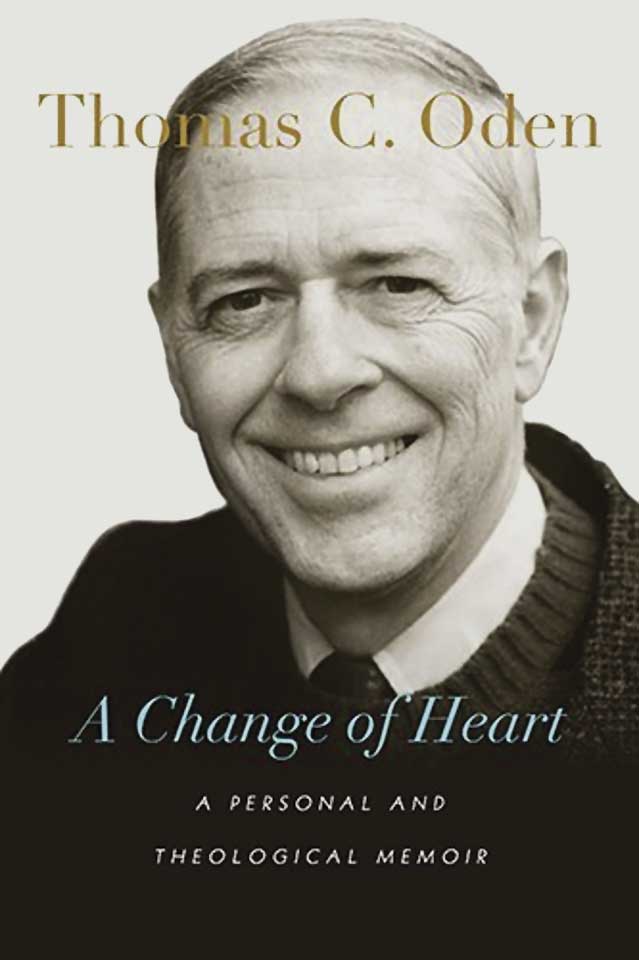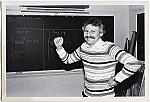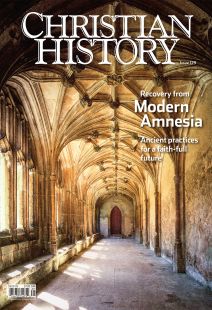“He made no new contribution to theology”
[Cover of Oden’s A Change of Heart www.ivpress.com]
THEOLOGIAN TIMOTHY GEORGE remarked in his eulogy for Thomas Clark Oden (1931–2016):
Few theologians of the past 100 years can claim to have had tea and cookies with Rudolf Bultmann, discussed theology with Karl Barth at his hospital bed in Basel, had lunch with Joseph Cardinal Ratzinger, had an audience with Pope John Paul II, driven through Galilee in a Fiat with Avery Dulles in the passenger seat, and conferred with Coptic and Pentecostal theologians in Africa.
From tea with Bultmann to time with the pope, Oden’s surprising influences paralleled his own massive paradigm shift. Turning from being the most liberal of liberal theologians to becoming a chief mover in a rediscovery of early church riches, Oden’s about-face revealed a life full of surprises indeed.
The country fiddler’s grandson
Tom Oden (as everyone called him) came from a home rooted in both the pietistic tradition and the political ideals of the Democratic Party. His parents were devoted to the Bible, music, and books—and deeply committed as well to liberal political philosophy and the union movement.
Oden’s grandfather was, he once said, “an Arkansas country fiddler.” He related that his grandfather’s love for music passed on to his dad, who always desired a house full of melody. Oden grew up in a home “pulsating with music of all kinds—classic, country, hymns, and popular songs.” He later believed his love for music helped him to think clearly and well about God:
It was through music that I first learned to reason. The reasoning process occurs through rhythm, melody, chords, progressions, transitions, and grace notes. From a young age I grasped intuitively that I could apply musical modes of mental organization to anything else I studied.
While music moved Oden to reason, books enthralled him with learning. A natural-born reader, Oden would steal into his father’s law office and surreptitiously read thick law books—when he was just 10. He mined for wisdom as he sifted through the lines of the many old tomes:
Dad purchased a set of small leather-bound books containing the shortened versions of classics such as [Shakespeare’s] Hamlet, [Jean-Jacques] Rousseau and the ballads of Robert Burns. One of them was Emerson’s Self-Reliance. I read it at an early age, maybe 10. Because of Emerson’s book, self-reliance became a key aspiration in my search for character.
In his undergraduate days at the University of Oklahoma, his love of the written word continued to shape him: “I spent hours at Rickner’s Book Store, looking for whatever new or used books I could afford,” he wrote; “I devoted endless hours to wandering freely around the open stacks of the great Bizzell Library, the largest research library in the state.” The library became an enchanted, “magical” learning space for Oden: “I was a happy bookworm feasting through long rows of shelves.”
Tested by atheism
However not all books would nourish life in the young man trying to make sense of human history; some would starve it. He found this out the hard way. In his early efforts to flesh out his beliefs, he “was particularly drawn to the agnostics and atheists, partly to let them test my belief system, which they did.” Immersing his mind in the thoughts of three key writers—Friedrich Nietzsche, Sigmund Freud, and Karl Marx—Oden absorbed from them ideas he later would have to unlearn.
He found Nietzsche “to be the most poetic and rhetorically powerful of all the philosophers” for many years—until he later discovered the work of Søren Kierkegaard. Sigmund Freud “forced me to question everything I had learned beforehand about psychological dynamics, abnormality, dreams and sexuality.”
Yet it was Karl Marx who most “stormed” into Oden’s “imagination, especially on the labor theory of value, the class struggle, and economic determination in history.” It would take 10 years for Oden to discern the faults in his hero:
As I looked back, [Marx] was full of flawed arguments, but they were central to my thoughts in the 50s. I let their words saturate my mind before I went to seminary, and they remained in my mind like a ghost well beyond my years at Yale.
In 1952 while he was at Oklahoma University, Oden met and married Edrita Pokorny; they would remain married until her death in 1998. Oden decided to attend seminary at Perkins School of Theology at Southern Methodist University. He felt called to Christian ministry, “but not to a ministry of evangelization or soul care.” He would eventually be ordained in the Methodist Church.
He later recalled, “Whenever I read the New Testament after 1950, I was trying to read it entirely without its crucial premises of incarnation and resurrection.” He admitted that this approach
required a lot of circular reasoning for me to establish what the text said. I habitually assumed that truth in religion was reducible to economics (with Marx) or psychosexual motives (with Freud) or self-assertive power (with Nietzsche). It was truly a self-deceptive time for me, but I had no inkling of its insidious dangers.
Sadly, he later said, “The saving grace of God on the cross was not in my mix of life-changing ideas.”
During Oden’s time at Perkins, he was exposed to a heavy helping of existentialist thought, which argued that humans define their own meaning. Jean-Paul Sartre, Albert Camus, Gabriel Marcel, and Rudolf Bultmann became close intellectual companions.
Bultmann (1884–1976) especially symbolized the direction of Oden’s thought in the early 1950s. The German thinker was best known for “demythologizing” the Bible—arguing that Jesus had to be stripped of the “mythical world picture” of the first century, including any belief in miracles or the supernatural, to make him relevant to the modern world.
After Oden left Perkins for graduate study at Yale, his PhD dissertation, granted in 1960, considered the theologies of Bultmann and Karl Barth (1886–1968); he eventually met both theologians. He continued to defend Bultmann in his academic writings until the mid-60s.
Oden remembered this period as one of theological experimentation combined with a mistrust and disdain for the past. His interaction with Scripture and other theological texts was less a dialogue than a “filtering process”; he allowed more traditional sources to speak to him “only insofar as they could meet” his “conditions,” his “worldview,” and his “assumptions as a modern man.”
The turning point came as Oden watched the tumultuous events of the 1968 Democratic National Convention. Serious disputes boiled over as security guards roughed up newsman Dan Rather and police clashed with antiwar protestors, sparking four days of violence. Oden recalled:
By that time, I had developed a preliminary revulsion against antinomianism [the rejection of laws] and anarchism, which would soon grow toward moderate political neoconservatism. When people started throwing excrement at the police in Chicago, I got scared, and I’ve never been the same since.
Throughout the 1960s Oden had been sincerely committed to liberalized abortion legislation in Oklahoma. He increasingly began to think that his advocacy of abortion rights demonstrated a fundamental misdirection in his own value structure. He wrote later that his support of individual choice as a fundamental value had led to the sacrifice of thousands of individual lives:
In the midst of all the rhetoric about freedom came the embarrassing awareness that I was condoning a moral matrix in which innocent life was being taken. That was a shock. It still is.
Oden’s revulsion over his abortion stance produced a further loss of confidence in a whole series of liberal programs he had previously supported, both political and theological: hedonism, autonomous individualism, the idolatry of the new moral relativism. Oden’s worldview had become a dead end. Where was he to turn? He had always focused on the future for solutions. Soon he would begin to look in the opposite direction.
Back to the fathers
Oden began teaching at Drew University in the early 1970s. Still heavily influenced by liberal theology and transactional psychology, he published Game Free: The Meaning of Intimacy in 1974. But soon Will Herberg (1901–1977), a well-known professor of Judaica and philosophy at Drew, became a key conversation partner of his. Though 30 years Oden’s senior, Herberg soon became his friend as well.
As their friendship grew, Herberg (a devout Jew) spoke to Oden very directly about his path as a theologian and a Christian. Oden writes that over lunch one day, their arguments came to a head:
Will was trying to show me the errors I was making were much deeper than I had realized. I tried to defend myself. Suddenly my irascible, endearing Jewish friend leaned into my face and told me I was densely ignorant of Christianity, and he couldn’t permit me to throw my life away.
Herberg further told Oden, “You will remain theologically uneducated until you study carefully Athanasius, Augustine, and Aquinas.“
The more Oden read theologians of the past, especially the church fathers, the more he realized that much of what he had taken for “new” was as old as the apostolic tradition itself:
I realized that I must listen intently, actively, without reservation. Listen in such a way that my whole life depended upon hearing. Listen in such a way that I could see telescopically beyond my modern myopia, to break through the walls of my modern prison, and actually hear voices from the past with different assumptions entirely about the world and time and human culture. Only then in my 40s did I begin to become a theologian. Up to that time I had been teaching theology without ever having sufficiently met the patristic mentors who could teach me theology.
Reading his epitaph
One night Oden had a dream that illustrated the dramatic reorientation of his values after that conversation with Herberg. In the dream he saw himself walking through the New Haven cemetery and reading his own epitaph. It read: “He made no new contribution to theology.” He awoke refreshed and relieved that he no longer had to produce something new as a theologian to fulfill his vocation:
In my dream I was extremely pleased, for I realized I was learning what Irenaeus meant when he told us not to invent new doctrine. . . . The dream somehow said to me . . . that my calling as a theologian could be fulfilled through obedience to apostolic tradition [the doctrines taught by the apostles and the early church].
Oden went on to write works specifically addressed to his United Methodist colleagues, encouraging them to recover the riches of Wesleyan tradition. He wrote five books on Wesley’s theology, edited an edition of Phoebe Palmer’s writings, and attacked mainline theology in Requiem (1995).
But most of all, from the 1980s on, Oden largely dedicated the remaining years of his life to significant projects in the field of patristics (the study of the early church). First of all in the 1980s and early 1990s, he released a three-volume systematic theology. It was structured around Trinitarian doctrine and based thoroughly on the works of the church fathers.
Soon he began work on an even bigger project: The Ancient Christian Commentary on Scripture (ACCS), a 29-volume patristic commentary on every book of the Bible. Oden linked the ACCS project to initial conversations he had with Joseph Ratzinger (later Pope Benedict XVI) and later conversations with Howard and Roberta Ahmanson, who helped resource the project. Oden’s visit with Ratzinger over four days in New York in 1988 “would remain important to me for the rest of my life. There I began to consider the deliberate study of the history of patristic exegesis as a paramount personal vocation.”
The real patristic deal
He told editors at InterVarsity Press—which took a huge risk publishing the ACCS series, one later richly repaid in sales—that he had once paid over $300 for a Bible commentary series based on the church fathers only to find it was a fraud. Now he proposed to do the job for real. He wrote later,
No one I knew was talking about a comprehensive correlation of every biblical passage with the best thoughts of patristic writers from the first to the eighth century. . . . The worshiping community needed a usable patristic commentary for its spiritual formation and homiletic wisdom. Historians needed better access to the history of exegesis. I needed a usable patristic commentary for my own spiritual formation.
This concern for spiritual formation sprang from what Oden called a conversion in his life and vocation as a theologian and the love he had developed for the church. Oden had written previously on pastoral care, but he increasingly began to view the deeper spiritual formation of Christians as a fundamental priority for his own teaching ministry. This led to his participation as a general editor for The Life with God Bible, on which he worked closely with Richard Foster, president of Renovaré (see “Living a 'with-God' life,” pp. 21–24).
Oden’s last major project included books on ancient African Christianity, including How Africa Shaped the Christian Mind (2007). He was instrumental in establishing the Center for Early African Christianity (CEAC), an active study center now housed at Yale. Oden’s work on the church fathers had revealed to him the importance of African perspectives on the ancient formation of Christian doctrine. He wrote in his memoir:
The Christians living on the African continent south of the Mediterranean had originally taught the Christians of Europe and the Middle East. Africans had informed and educated the very best of Syriac, Cappadocian, Greek and Latin teachers. . . . Christianity on the African continent had a much longer history than was portrayed by many of its modern colonial expressions.
He would eventually publish three books on African Christianity. In all he ended up writing over 50 books in addition to his work as an editor on the ACCS and its related projects.
At the end of A Change of Heart, Oden looked back over his life (he would die only two years after the memoir was published in 2014) and saw God’s providence at work:
I have faced problems common to all, yet it still amazes me that after living such a fragmented life for the first forty years, I have come out of it with a clear identity, a sustainable sense of self and unity of purpose grounded in salvation history. Many times I have compared one stage with another, but those changes have seemed to me to be the core events in my spiritual formation. Those unexpected turns are the story.
Oden’s tombstone at Rose Hill Burial Park in Oklahoma City does not identify him as having “made no new contribution to theology.” But the body of work he has left us does. C H
By Christopher A. Hall
[Christian History originally published this article in Christian History Issue #129 in 2019]
Christopher A. Hall is president of Renovaré, associate editor of the Ancient Christian Commentary on Scripture, and author of four volumes on patristic theology, Scripture reading, worship, and discipleship. Excerpts are taken from A Change of Heart by Thomas C. Oden. ©2014 by Thomas C. Oden. Used by permission of InterVarsity Press, P.O. Box 1400, Downers Grove, IL 60515-1426. www.ivpress.comNext articles
Fulfilling a longing for the early church
An excerpt from Oden's Ancient Christian Commentary
Thomas C. Oden and Christopher A. HallTaking the long view back
Nineteenth- and twentieth-century renewal and cooperation
Jennifer Woodruff Tait“The road to the future runs through the past”
Bob Webber and the “ancient future” of American evangelicalism
Joel Scandrett







